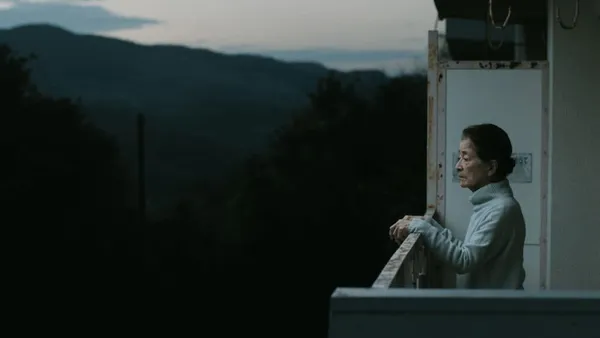 |
| Chieko Baisho in Plan 75 |
For most people, old age is hard work. It gets more difficult to do ordinary things, one is more likely to need care, and there’s a higher risk of becoming socially isolated. It’s still more difficult in a society which is hostile to older people, where discrimination affects basic needs. Some older people worry that their very existence is a burden on their loved ones. What if there was a simple, government-run program which would take care of all your affairs, give you a cash payment to enjoy or pass along , and provide you with a painless death? This is the premise of Plan 75, but as director Chie Hayakawa explains, reality is more complicated. Rather than exploring the rights or wrongs of euthanasia, she wanted to use this idea to explore attitudes towards elderly and otherwise vulnerable people, and to encourage empathy across generations.
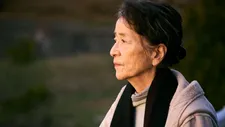 |
| Chieko Baisho as Michi |
“The film deals with the subject of the super ageing society problem in Japan, but that was not my interest,” she explains. “Actually, I wanted to raise a question about how our society is becoming more and more intolerant to the socially weak people. People nowadays often talk about the value of life based on productivity, and I heard many discriminatory comments by politicians or celebrities in Japan, bashing the elderly or the disabled people or the poor people. Also, that influences public opinion. And I feel so upset. I feel anger towards society. It's so harsh on these people.
“In 2016, in Japan, a man killed 19 disabled people and injured dozens. The killer said he did it for good reason, because he believes that disabled people are a burden to society. That's why he eliminated them. I was shocked by what happened, but at the same time, I thought, ‘This incident was not caused by just one crazy person.’ It happened because of social factors and an atmosphere of extreme rationalism in our society. So that particular incident triggered me to make this film. the concept of Plan 75 just came down to me, and then I strongly felt that I have to make this film.
“It's not a film about pro or con euthanasia. There is a motif of assisted suicide in the story, but it's not the theme of this film. How we die, or one’s attitude towards death, is a very personal thing. It’s not something I wanted to judge. By telling this story, I wanted to stimulate people's imagination and compassion to others’ pain and emotion, who are in certain circumstances. So I try to not judge anyone. I wanted to leave how they feel to the audience. It's all up to them, how to perceive it.”
The plan is promoted with adverts which use a lot of soft focus, gentle music and smiling faces.
“I think it's a kind of caricature of what our government may like to do,” she says. “I often find that the government tries to rephrase inconvenient truth with nice and friendly terms and tries to manipulate impressions by using commercials and PR. The advertising campaign covers up the negative element and real issue. But people easily get used to watching it and accept it. That makes people stop thinking and become blind to the reality. That’s what I wanted to depict.”
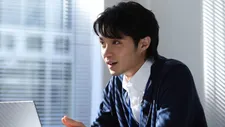 |
| Hayato Isamura as Hiromu |
We also see young salespeople who phone older people and try to encourage them to sign up for the plan.
“I wanted to portray their insensitiveness and lack of imagination to others’ emotion. People who promote Plan 75 don't have a sense of guilt. They don't really want to eliminate the elderly, but they're doing it because that's their job, and they just stopped thinking what's going to happen to these elderly people after they leave. I think that insensitiveness and soullessness is a thing, even though they do it unconsciously. So I kind of push that characteristics in Hiromu, the salesperson, who, unconsciously or consciously takes part in this inhuman system.
“Discrimination to the elderly people does exist in Japan. It's very subtle. It's not so obvious, but it does exist. I read the news articles and watch documentaries about how difficult [it is for] a single elderly person to find a job, find a place to live. And that's one of the reasons a lot of people start feeling worry about getting older. In this film, Michi, the protagonist, once she loses her job, it's so difficult for her to find a place to live. That's actually happening in Japan, so it's not fiction, I think. It is based on reality.”
I ask about the little details in the film which remind us of the extra effort involved in day to day life as an older (or disabled) person, and ask where they originated.
“I think most of them were the actress’ ideas,” she says. “Chieko Baisho is a legendary Japanese actress. She did it so naturally. I love that movement. And also, do you remember the thing when she got fired from her job? She's cleaning up the house, on the very last day of work, and she cleaned the door of the locker and said ‘Thank you,’ and bowed to the locker bar. That was the actress’ idea. That behaviour tells what kind of person Michi is, and what kind of life she has been through. I was so moved and touched when I was shooting that scene. All the details that she expressed, that she acted, I thought it's great that it came from herself. That really tells me she has the character.
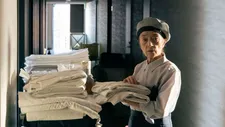 |
| Michi is still working in her seventies |
“After I finished writing the script, I was thinking ‘Who’s going to be a good person to play that character?’ Because Michi, the protagonist, is having so much trouble. This is a very sad, black story. But I don't want to make her miserable. I want this protagonist to have dignity and a beauty and strength in herself. Them Chieko Baisho was the first person to come up to my mind. I contacted her and she read the script and she said she needed to meet me before she decided.
“We had a meeting and discussed why I wanted to make this film, what kind of person this woman is, and she understands and she believes in this story. And she said she said she stopped reading the script in the middle because the story is too harsh and too cruel to the elderly. But later she opened the script again and read it through to the end. She said she liked the last scene, the decision she made. Then she decided to take this role.”
It’s important to her that the film features young people in significant roles, as well as older people.
“If it's a story about only the elderly person, it maybe limits the range of audience, and also I want a younger audience. I want to make the younger audience have a chance to feel compassion to the elderly. We are divided into the elderly and the young because we have the ageing problem in Japan. Hostility to the elderly is increasing among the young. They feel they're sacrificing their lives because they have to support the elderly. The younger people are having a harsh ride. That's why the hostilities start booming. I want to let them know that each of the people have their history and emotions.
“They're not different people they are. We're all in a continuation. Age is a continuation. When we get older, let's say when we get to 70 years old, they are same person as me in my forties. It's that kind of thing that I want the audience to know.”
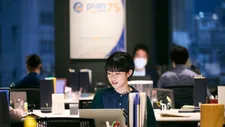 |
| Yuumi Kawai as Yôko |
The film has certainly been having an effect on viewers.
“One of the feedbacks that I got from the audience was from a woman who was thinking that she wants Plan 75. She thought it's good that we have the option, because she had a lot of concerns about being old, she's worried about loneliness. What if she became sick? What if she is living alone? So if there is such an option, she feels more relieved. But after she watched this film, she changed her mind. She got upset: ‘Why should I die this way, without dignity?’ She realised how inhuman that system is. Then she felt like ‘No way! I will choose to live,’ instead of giving up her life in order to not to be a burden to society or others. So she kind of gave back her decision based on what she wants, not based on what society wants or what others want. I was so glad to hear such feedback from the audience.”
Now she’s ready to explore something different.
“I am working on my next film. Plan 75 is a social issue oriented film so I wanted to make a very different one. It’s a more personal story based on my childhood experiences. I just started writing a script. Hopefully, that's shooting next year.”





















